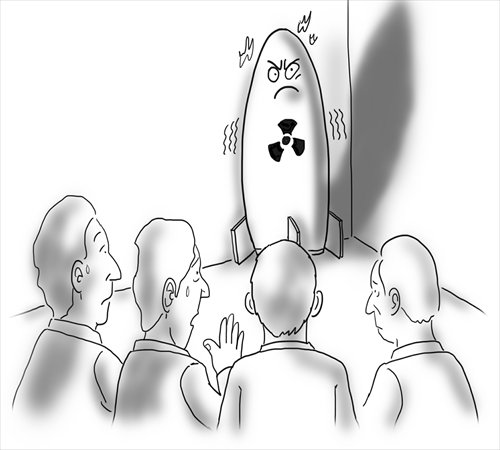Consensus needed to impose pressure on Pyongyang

Illustration: Liu Rui/GT
After North Korea conducted the fourth nuclear test and satellite launch earlier this year, the UN Security Council adopted in March the Resolution 2270 that imposed the toughest ever sanctions on Pyongyang. While more than 90 percent of North Korea's foreign trade goes through China, Beijing has resolutely vowed to implement the resolution. China stands in line with the international community to respond toughly to Pyongyang's capricious nuclear activities. Without China's constructive participation, it would be impossible to ink the unprecedented resolution, and the situation in the Korean Peninsula cannot be effectively controlled.
Even so, there are still voices, some from South Korea, saying that China should assume the major responsibility if the sanctions are not implemented as expected. They accuse China of doing little to rein in illegal trade with Pyongyang even though it has carried out the sanctions on legal trade. They question whether the loopholes in China will render the sanctions ineffective in curbing Pyongyang's nuclear development or whether Beijing will even be a double-dealer in the case.
There are numerous evidence to rebut these blames. Above all, China has shown firm support to the resolution, and insisted it must be carried out in an all-around and honest manner. China has been committed to safeguarding peace and stability in Northeast Asia and showed the utmost sincerity to the united action of the UN.
The stringent and swift implementation of the resolution can be proven by that in recent days Pyongyang has insinuated discontent with China's solid support to the sanctions through some channels. China's explicit stance and downsizing trade with Pyongyang due to sanctions has obviously exerted huge pressure on North Korea.
Besides, how to make Pyongyang renounce nuclear weapons and to denuclearize the peninsula has long been a thorny issue that requires multilateral mechanism to seek a solution. Hence China demanded the Six-Party Talks be included in the resolution.
The top leaders of China and North Korea have not paid state visits to each other's country since they took office and have never met even in a third country. These combined signal that China is not to be blamed for the ineffectiveness of previous sanctions. Countries have to assess China's geopolitical efforts over North Korea objectively and evaluate fairly China's actions in imposing sanctions on Pyongyang.
Moreover, the international community, including China, fully understands South Korea's concerns about the future of Pyongyang's nuclear development and its possible attacks on Seoul, and has been committed to maintaining stability in the peninsula through political and diplomatic means.
Others shouldn't find fault with China's sanctions. After all, both China and South Korea need to consider the wellbeing of North Koreans and evade the possibility of humanitarian disasters brought about by sanctions. It also takes time to crack down on and exterminate illegal trade at the border area. For instance, the widespread trafficking of humans and drugs over the US-Mexican border doesn't mean the two governments are incapable of tackling it. North Korea has already caused harm to China by trafficking drugs and counterfeiting money. China firmly opposes this and needs to fight it harshly.
Certain countries shouldn't use groundless or accidental incidents to create a favorable atmosphere for them to have a bigger say in pressuring China. This will achieve nothing, but jeopardize the basic consensus and trust concerning the nuclear issue formed between China and South Korea.
The author is director of the Institute of Northeast Asian Studies, Heilongjiang Provincial Academy of Social Sciences. opinion@globaltimes.com.cn Follow us on Twitter @GTopinion